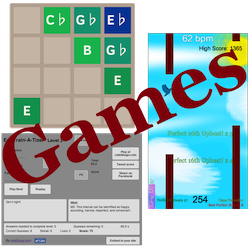In the past I’ve heard people say that we Christians should eliminate any sources of entertainment in our lives that are not of a profound spiritual nature. That somehow all of the art we consume has to be holy and set apart to glorify God and all other art should simply be dismissed. Also, in the dark past of recent Christian history even certain sounds themselves were considered unfit for worship in the church. The drum set has been (and rare cases still is) an instrument of the devil and having the beat on two and four causes a raging desire for unholy pleasures (if you know what I mean). This detail in particular offends me deeply since playing drum set is one of the primary ways in which I worship my Savior.
Since I’m dealing with extremes, I should probably shed light on the opposite end of the spectrum: Since the earth and everything in it is the Lord’s, he has the ability to redeem anything. This must include art. So people take that to mean that if they are believers, they can consume any art they want and so long as they are using the experience to learn about God.
Both of these extremes are equally dangerous. The former because to consider any human art as incapable of being corrupted is itself a clear demonstration of pride (the most satanic and destructive sin of all). Similarly, it is shameful for a man to think he has the authority to label anything or anyone unfit for the kingdom of God. It’s God’s call, not ours. It is also dangerous because this view makes accusations based on a lack of cultural familiarity and not the word of God. The drum set and the guitar are intimate parts of our culture, and to condemn the objects themselves without clear biblical grounds means that we (not God) condemn the culture we do life in. Not to mention that this is a sick and twisted materialistic view of holiness. Holiness comes from our hearts, minds, and lives, not the tools we use to show admiration to God.
The other extreme is dangerous because Satan uses very subtle ways of getting us to stray from our faith, and one tool he’s very fond of is beauty out of its proper context. Dance is a wonderful artistic tool, but it can be used in a pornographic way very easily and subtly (I define pornography as anything meant to awaken sexual desire outside of it’s proper context). It can be very easy for a man (or woman really) to justify consuming such art by saying that they are admiring a well crafted and beautiful presentation that has no obvious sexual reference. Yet they know that watching is encouraging them to fall into lust. The principal in this example applies to everything. If you’re reaction to a work of art is sin, or the art has the intent of tempting us rebel against God then don’t consume it. At the same time, don’t instinctively condemn art because you’re reaction to it is sin because it may be you that is the problem and not the art.
So then, there is no clear line of right and wrong when it comes to entertainment. There are some things that can be labeled as a clear attack on the moral principals that guide us in our daily lives, but most secular art is not that simple. Use the good judgement that God gave you. Don’t listen to things that make you stumble in your walk with Christ, meditate on the things that draw you closer to Him, and don’t consume art you’ve approved for yourself around you weaker brothers and sisters (who you are commanded to love) that can’t handle it.
I would like to end this by justifying and recommending a work of art that is clearly secular. In 1997, The Five Sacred Trees, by John Williams, was released and added to the neglected genre of “Bassoon Concerto”. If you don’t know what a bassoon is, I strongly urge you to purchase this recording and consume it until you are well informed about the beauty of the sound which a bassoon can produce. This work is a beautiful depiction of a very specific component of nature, and it is very easy to use this work to help you marvel at the wonderful creation around you. Ever since I consumed this work, I have not been able to look at a tree without marveling at God’s awesome workmanship. However, it is very possible that some believers have struggled with tree worship and witchcraft in their past. I highly doubt I’ll ever come into contact with someone like this since tree worship has not been common for quite some time, but if a rare exception stumbles upon this work I would strongly recommend that they carefully consider what their reaction might be before they listen to this. I mean this very sincerely, but I also mean it as an example of what I’ve just discussed. Just because one person stumbles into sin because of a work of art doesn’t make the work unholy. It simply means that the person should not be listening to it.
Do purchase and enjoy this work. It is $4.95 on iTunes, and worth every penny. Feel free to give it a rating and write a review as it needs much more attention than it has gotten these 13 years. ![]()


